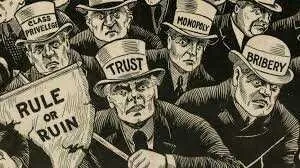I examine the real history of scattering trust in the US, and it's not the same history you teach about Teddy Roosevelt and progressive school. My research will be presented in a series of posts though this one is purely an introduction and is meant to provide a basic overview of the historical context.

The belief that emerged in the late 1800s is not an act that appears in corporate greed, as we tend to think. The recently merged merger trends are largely the result of progressive thinking that integration and cooperation are better than tight business competition. If two companies find themselves in competition, progressive thinking suggests they should join rather than work against each other.
Progressives began to write about goals such as efficiency and cooperation as early as 1864: "the word is at the beginning of a new era of social progress and which may be the highest that material civilization can achieve" This is an era of cooperation Until now competition has been regarded as an agent but the principle of competition is one of competition and struggle.This is my neighbor's beggar system, most useful in the early stages of civilization, but the least worthy of civilization in its maturity.This is expensive, because it requires a lot of companies and companies to do work that would be more economically done by one. "(From" The city of good, "Blackwood's Edinburgh magazine, September 1864)
Integration and cooperation mean the incorporation and concentration of previously separate businesses, all in the name of efficiency. This is how progresivism begins.

But there was a strong reaction to this type of business concentration which became known as the confiscation movement. Schools still teach that it is progressive which is a crush of trust, but it is not accurate. The Progressive Party's platform clearly states, "The concentration of modern business is, in some ways, inevitable and necessary for the efficiency of national and international business."
So if progressive does not initiate a confiscation movement, who does it?
That's actually another group called Populists. The farmer is the first populist and populism also known as the "rural uprising" because he lives in a rural farm community, away from the city center. The early populists were small farmers who had two problems: they were deeply indebted, and competed with a larger, more efficient, "progressive" farm in the east. For populists, greater efficiency and size are not things to be respected.
Farmers and tenant farmers, grassroots members of the populist, need a way to compete with these larger farms. One way is to label the "land monopoly" to them and ask the federal government to prohibit companies from owning more land than they need, especially on land grants for railroad companies made possible by the Ministry of Home Affairs. There are already laws that oppose monopolies in some states, but farmers are beginning to move toward federal law, hoping to eliminate their competition with larger farms in other countries.
Today we are thinking about the government's efforts to prevent monopolies in an attempt to prevent higher prices of monopolies usually charging consumers. But the strange thing about the first federal law produced against the monopoly - the Sherman Anti-Destructive Act - is that it is not meant to prevent high prices that harm consumers. It is intended to prevent low prices that harm producers. Next time, we'll dive into the Antitrust Sherman Act and see how the destruction of trust is really done, and why...?